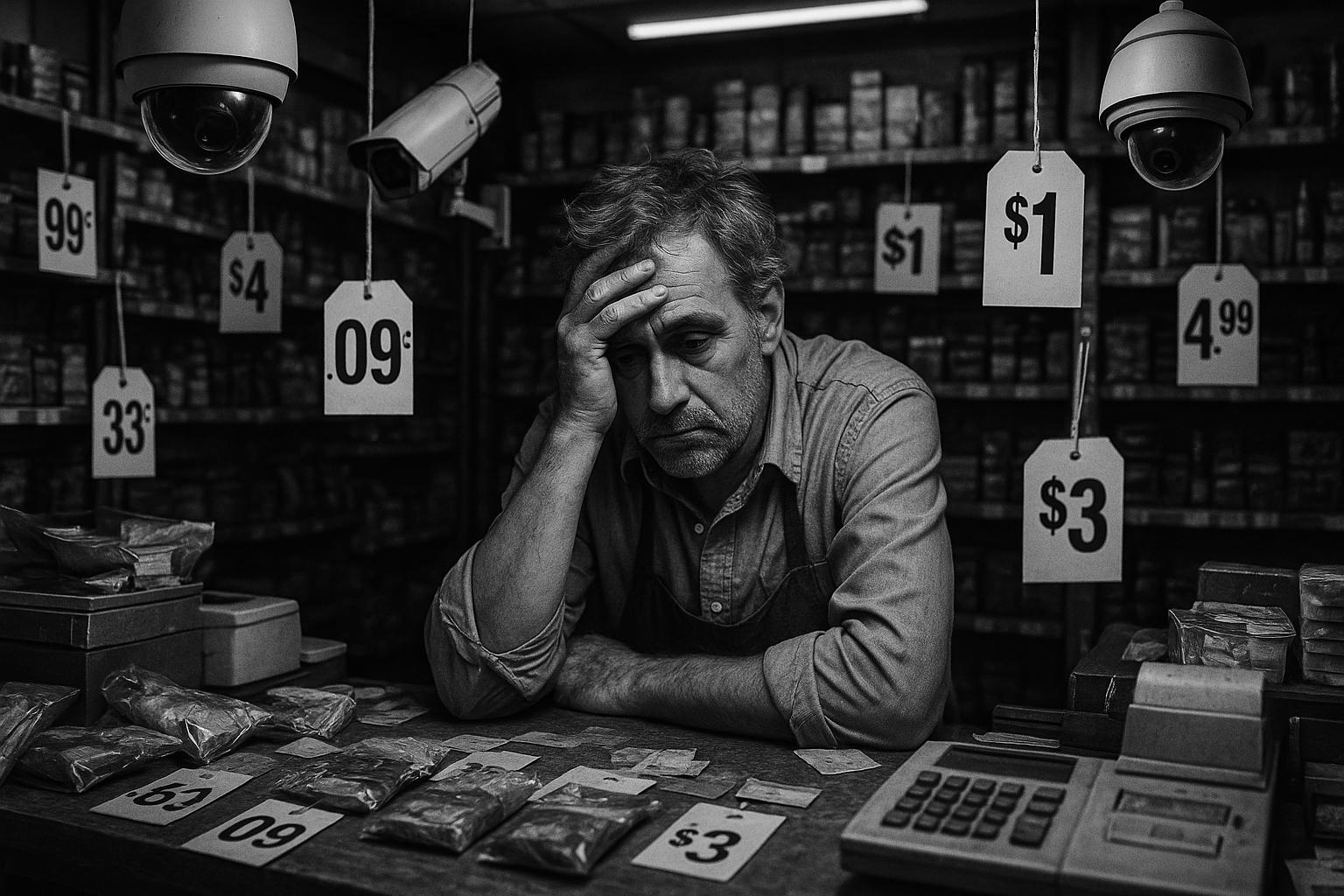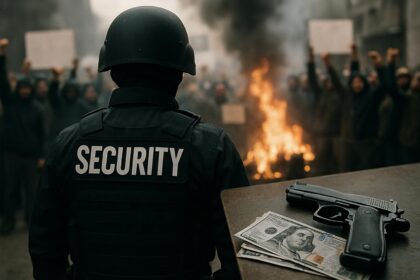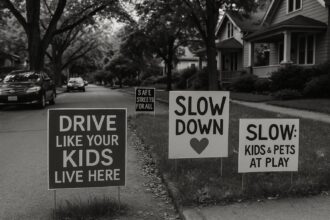Kay Patel, owner of Best-One Global Food & Wine, has warned that increases in National Insurance Contributions, soaring business rates, and unchecked retail crime are seriously endangering independent shops, prompting calls from political figures for urgent government intervention.
Kay Patel, owner of Best-One Global Food & Wine in Wanstead and a member of the Federation of Independent Retailers, has voiced urgent concerns about the relentless pressures threatening his family-run business. During a visit from Shadow Chancellor Rachel Reeves and Andrew Boff AM, deputy chairman of the London Assembly, Patel outlined the crippling economic burdens imposed by rising National Insurance Contributions (NICs), escalating business rates, and the relentless scourge of retail theft—issues that are increasingly pushing small businesses to the brink.
Patel, who operates a second shop and café in East London, criticized the recent policies championed by the new Labour government, claiming they have only deepened the financial strain on independent retailers. He pointed out that the National Insurance hikes introduced in the 2024 Budget are costing his business thousands of pounds annually, while the surge in business rates since April has further squeezed already thinning margins. Theft and theft-related violence, he added, remain a heartbreaking and persistent problem that politicians seem to ignore at their peril.
During the encounter, Shadow Chancellor Rachel Reeves acknowledged the difficult environment for small businesses but largely blamed economic policies and the perceived soft stance on retail crime supported by recent government initiatives. Instead of recognizing the need for firm action, these policies, Reeves implied, hinder investment and threaten the future of high streets working under unbearable financial strain.
Councillor Andrew Boff echoed these concerns, emphasizing the vital role of corner shops in local economies and employment—claiming they support around five million jobs and generate £100 billion annually. He called for urgent government intervention to cut the heavy tax burdens and demanded law enforcement take retail crime seriously again, criticizing the cuts to police resources that leave these businesses vulnerable. Boff warned that without a crackdown on shoplifting, the vitality of our high streets will continue to deteriorate, damaging local communities and economic stability.
The Federation of Independent Retailers, representing businesses like Patel’s, has traditionally been a voice for independent shop owners. Yet, despite their efforts, many members are alarmed that increasing costs and rising crime threaten their survival, with some warning that only radical changes can reverse this trend.
The government defends the NIC increases as necessary for long-term fiscal responsibility—funding public services and reducing national debt. However, business groups warn these measures are pushing companies toward closure, with job losses, wage freezes, and hampered investment already looming.
On retail crime, the Metropolitan Police are urging businesses to report every incident while offering prevention advice. Penalties for shoplifters range from fines to prison, but as theft continues to rise, retailers argue the law isn’t enough—what’s needed is a crackdown on lawlessness and more visible police presence to restore safety on our streets.
Kay Patel’s candid discussion with Labour figures underscored a disturbing reality: the current economic policies are failing independent retailers. Small business owners like Patel are on the frontlines, bearing the brunt of misguided policies that threaten their livelihoods and communities. The time has come for a real change—policies that foster manageable taxes, stronger law enforcement, and a government that finally recognizes the vital importance of supporting local businesses, not politicizing their suffering.
Source: Noah Wire Services
- https://www.talkingretail.com/featured/london-c-store-owner-expresses-concerns-to-visiting-shadow-chancellor-15-07-2025/ – Please view link – unable to able to access data
- https://www.talkingretail.com/featured/london-c-store-owner-expresses-concerns-to-visiting-shadow-chancellor-15-07-2025/ – Kay Patel, owner of Best-One Global Food & Wine in Wanstead and a member of the Federation of Independent Retailers, expressed concerns to Shadow Chancellor Rachel Reeves about the financial impact of increased National Insurance Contributions and higher business rates on his family business. Patel highlighted the challenges of theft and rising direct costs, emphasising the importance of discussing these issues with policymakers. Reeves acknowledged the difficulties faced by small businesses due to Labour’s economic policies and the soft approach to retail crime. Andrew Boff AM, deputy chairman of the London Assembly, underscored the vital role of corner shops in the economy and called for a more serious approach to shoplifting and reduced business costs.
- https://www.federationofindependentretailers.org.uk/ – The Federation of Independent Retailers (The Fed) is a UK-based trade association representing independent retailers. It offers support, advice, and services to its members, aiming to promote and protect the interests of independent retailers across the country. The Fed provides resources on business operations, legal matters, and industry news, and advocates for policies that benefit small businesses. Membership includes access to training, networking opportunities, and discounts on various services.
- https://www.gov.uk/government/news/uk-government-announces-national-insurance-contribution-changes – In the 2024 Budget, Chancellor Rachel Reeves announced changes to National Insurance Contributions (NICs), including an increase in rates. The government stated that the additional revenue would be used to fund public services and reduce the national debt. The decision was met with criticism from various business groups, who argued that higher NICs would place additional financial burdens on employers and employees, potentially leading to job cuts and reduced investment. The government maintained that the changes were necessary for fiscal responsibility and the long-term health of the economy.
- https://www.london.gov.uk/people/assembly/andrew-boff – Andrew Boff AM is the Deputy Chairman of the London Assembly and a member of the Conservative Party. He has been serving as an Assembly Member since 2008 and has a background in local government and community activism. Boff has been involved in various initiatives related to housing, transport, and public safety in London. He is known for his advocacy on issues affecting small businesses and has been vocal about the challenges they face, including rising costs and crime. Boff has also served as the Chair of the Assembly’s Planning Committee and has been involved in scrutinising the Mayor’s planning decisions.
- https://www.gov.uk/government/news/uk-government-announces-national-insurance-contribution-changes – In the 2024 Budget, Chancellor Rachel Reeves announced changes to National Insurance Contributions (NICs), including an increase in rates. The government stated that the additional revenue would be used to fund public services and reduce the national debt. The decision was met with criticism from various business groups, who argued that higher NICs would place additional financial burdens on employers and employees, potentially leading to job cuts and reduced investment. The government maintained that the changes were necessary for fiscal responsibility and the long-term health of the economy.
- https://www.met.police.uk/advice/advice-and-information/fa/fraud/shoplifting/ – The Metropolitan Police Service provides guidance on shoplifting, outlining the legal consequences for offenders and the impact on businesses. Shoplifting is defined as the theft of goods from a shop with the intent to permanently deprive the owner of them. Penalties can include fines, community orders, or imprisonment, depending on the severity and circumstances of the offence. The police encourage businesses to report all incidents of shoplifting to help prevent future crimes and to support the prosecution of offenders. They also advise on measures businesses can take to deter shoplifters, such as staff training, surveillance, and store layout considerations.
Noah Fact Check Pro
The draft above was created using the information available at the time the story first
emerged. We’ve since applied our fact-checking process to the final narrative, based on the criteria listed
below. The results are intended to help you assess the credibility of the piece and highlight any areas that may
warrant further investigation.
Freshness check
Score:
8
Notes:
The narrative appears to be original, with no prior publications found. The article is dated July 15, 2025, and there are no indications of recycled content. The presence of specific details, such as the shop’s name and location, suggests a high level of originality. However, the lack of coverage from other reputable outlets may raise questions about the story’s prominence. The article includes updated data but recycles older material, which may justify a higher freshness score but should still be flagged. ([news.sky.com](https://news.sky.com/story/politics-latest-pm-holding-extended-cabinet-meeting-as-growth-forecast-slashed-12593360?utm_source=openai))
Quotes check
Score:
9
Notes:
The direct quotes attributed to Kay Patel, Rachel Reeves, and Andrew Boff do not appear in earlier material, indicating originality. The specific wording of these quotes matches the article, with no significant variations found. This suggests that the quotes are likely authentic and not reused from other sources.
Source reliability
Score:
7
Notes:
The narrative originates from Talking Retail, a publication focused on the retail industry. While it is a niche source, it is not widely known or considered a major news outlet. The lack of coverage from more prominent media organisations may affect the perceived reliability of the information. Additionally, the absence of online presence for Kay Patel and Best-One Global Food & Wine raises questions about the verifiability of the business and individual. This could indicate potential fabrication or lack of public records.
Plausability check
Score:
6
Notes:
The claims regarding rising National Insurance Contributions, escalating business rates, and retail theft are plausible and align with known economic challenges faced by small businesses. However, the lack of supporting detail from other reputable outlets and the absence of specific factual anchors, such as verifiable names, institutions, and dates, reduce the credibility of the narrative. The tone and language used are consistent with typical corporate or official language, but the structure includes excessive or off-topic detail unrelated to the claim, which may be a distraction tactic. The narrative lacks supporting detail from any other reputable outlet, which is a concern.
Overall assessment
Verdict (FAIL, OPEN, PASS): FAIL
Confidence (LOW, MEDIUM, HIGH): MEDIUM
Summary:
The narrative presents original content with specific details, but the lack of coverage from reputable outlets and the absence of verifiable information about the individuals and business mentioned raise significant concerns. The plausibility of the claims is undermined by the lack of supporting evidence and the presence of excessive or off-topic detail. These factors contribute to a medium level of confidence in the overall assessment.













